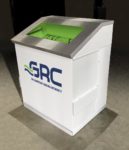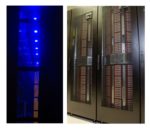Researchers using the Frontera supercomputer at the Texas Advanced Computing Center (TACC) have uncovered the atomic makeup of the sugary shield on the coronavirus that could prove instrumental to the workings of the contagion, now spreading death, illness and economic destruction around the world. UCSD scientists have used about 2.3 million Frontera node hours for molecular dynamics simulations and modeling.
Search Results for: TACC
TACC’s Frontera Supports Investigation of Subatomic Protons – ‘the Origin of the Mass of Objects’
A team of researchers are using the Frontera supercomputer at the Texas Advanced Computing Center (TACC) to crack open the proton, a fundamental building block of the atomic nucleus that is used, among other ways, as a medical probe in magnetic resonance imaging. Frontera, the world’s fifth-ranked HPC system on the Top500 list and the […]
Interview: Fighting the Coronavirus with TACC Supercomputers
In this video from the Stanford HPC Conference, Dan Stanzione from the Texas Advanced Computing Center describes how their powerful supercomputers are helping to fight the coronavirus pandemic. “In times of global need like this, it’s important not only that we bring all of our resources to bear, but that we do so in the most innovative ways possible,” said TACC Executive Director Dan Stanzione. “We’ve pivoted many of our resources towards crucial research in the fight against COVID-19, but supporting the new AI methodologies in this project gives us the chance to use those resources even more effectively.”
TACC Powers Galaxy Bioinformatics Platform for COVID-19 Analysis
Researchers are using TACC supercomputers to power the Galaxy Bioinformatics Platform for COVID-19 analysis. More than 30,000 biomedical researchers run approximately 500,000 computing jobs a month on the platform. “Since 2013, TACC has powered the data analyses for a large percentage of Galaxy users, allowing researchers to quickly and seamlessly solve tough problems in cases where their personal computer or campus cluster is not sufficient.”
Podcast: Inside TACC’s Frontera Supercomputer
In this Intel Chip Chat podcast, Dan Stanzione from TACC discusses the architecture and capabilities of Frontera, TACC’s newest HPC cluster. “Frontera’s architecture includes 8,000 servers, each powered by 2nd Generation Intel Xeon Scalable processors. The cluster includes hundreds of thousands of processing cores and a liquid-cooled infrastructure enabling a higher clock rate for even more performance.”
NVIDIA Powers GRC Immersion Cooled System at TACC
Today GRC announced its joint project with NVIDIA to help power a GPU-intensive computing subsystem for TACC’s Frontera Supercomputer, the world’s largest academic supercomputer. GRC is proud of its long history with TACC and we’re delighted to have been able to collaborate once again with NVIDIA to help power the next generation of academic research,” […]
TACC Unveils Frontera – Fastest Supercomputer in Academia
Today TACC unveiled Frontera, the 5th most powerful supercomputer in the world. “Frontera has been supporting science applications since June and has already enabled more than three dozen teams to conduct research on a range of topics from black hole physics to climate modeling to drug design, employing simulation, data analysis, and artificial intelligence at a scale not previously possible.”
John West from TACC Elected Chair of SIGHPC
John West from TACC is the newly elected Chair of SIGHPC. SIGHPC is the first international group within a major professional society that is devoted exclusively to the needs of students, faculty, researchers, and practitioners in high performance computing. SIGHPC’s mission is to help spread the use of HPC, help raise the standards of the profession, […]
TACC Powers Climate Studies with GRACE Project
Researchers are using powerful supercomputers at TACC to process data from Gravity Recovery and Climate Experiment (GRACE). “Intended to last just five years in orbit for a limited, experimental mission to measure small changes in the Earth’s gravitational fields, GRACE operated for more than 15 years and provided unprecedented insight into our global water resources, from more accurate measurements of polar ice loss to a better view of the ocean currents, and the rise in global sea levels.”
TACC Upgrades Ranch Storage System for Wrangling Big Data
TACC has completed a major upgrade of their Ranch long-term mass data storage system. With thousands of users, Ranch archives are valuable to scientists who want to use the data to help reproduce the measurements and results of prior research. Computational reproducibility is one piece of the larger concept of scientific reproducibility, which forms a cornerstone of […]













